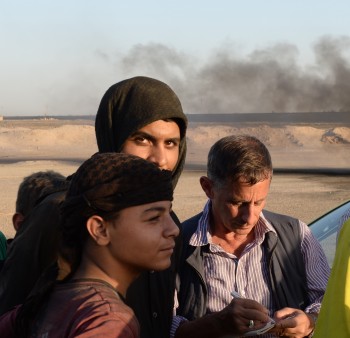War's Witness

Gutman (right) conducting interviews in Deir el Zour, eastern Syria, in July 2013, just before ISIS threatened to detain all reporters the group caught.
Details
There are rules that Pulitzer Prize-winning journalist Roy Gutman '66 has learned in a lifetime of international reporting. When those in power make it impossible to report a story, use ingenuity and everything possible to circumvent them. They are hiding something, and there's always a way around.
And when no one believes you or seems particularly interested in what you're reporting, keep going. Persist until the world knows.
It's how Gutman, currently Middle East bureau chief for the McClatchy newspaper chain, along with his photographer Andree Kaiser, became the first Western journalist to document death camps in Bosnia-Herzegovina. Gutman was awarded the 1993 Pulitzer Prize in international reporting for his work.
Now based in Istanbul (with the occasional visit home to suburban Washington, D.C.), Gutman is focused on the Syrian civil war and, in particular, the fate of some eight million internally displaced persons (IDPs) whom the world is virtually ignoring.
“What drives me is that you have an immense population of innocent civilians that the world has abandoned,” says Gutman, who's clearly driven to get the word out. (His visits to IDP camps take months to organize and a small phalanx of soldiers for protection.)“The United Nations doesn't even know how many IDPs there are. The problem is so big, so catastrophic, that people throw up their hands.”
Gutman immerses himself in his stories. In mid-February, for example, he traveled to the small desert village of Ay, home to the Jordanian pilot burned alive by ISIS, to witness a day of mourning attended by more than 1,000 people. The day before, he interviewed angry, passionate Jordanians as they demonstrated and burned photos of ISIS leaders at a rally in Amman.
Gutman didn't envision himself as a conflict journalist. In his early career he was a diplomatic reporter based in Washington. His interest in Cold War politics took him to Germany, and later he documented the fall of Communism throughout Europe. As the world changed, Gutman's focus turned to wartime human rights, especially after he covered atrocities in the former Yugoslavia.
At age 70, Gutman still has the eagerness of a cub reporter. He has written or edited four books: Banana Diplomacy: The Making of American Policy in Nicaragua, 1981-1987; A Witness to Genocide; Crimes of War (co-edited with David Rieff); and How We Missed the Story: Osama bin Laden, the Taliban, and the Hijacking of Afghanistan. And he brings a historical depth and analysis to his books and stories, which border on long features peppered with quotes from those suffering most.
His education prior to journalism has helped. After graduating with a history degree from Haverford (he focused on British constitutional and medieval history, and Russia/Eastern Europe) Gutman earned a master's degree in international relations from the London School of Economics. He speaks German and Serbo-Croatian.
“When I write a story about war crimes, I try to figure out a way to get the U.S. government or the U.N. to weigh in,” he says.“My feeling is, if you have the legal framework as well as the human side, you can write stories that are much more effective and allow the reader to decide, ‘Do I want to live in a world where my government is closing its eyes to crimes?' ”
Married to a retired animal-rights lobbyist, Gutman admits he can't always measure how much his reporting matters, though his Serbian dispatches were credited with saving thousands of lives and eventually shutting down death camps.
“I can't keep this up forever,” he says of war reporting,“but it's rewarding in the sense that I'm on to real issues and doing stories that matter. You have to have high standards, and once you're convinced of something, you keep going, and that's what drives me now. I can't walk away from this story.”
—Anne Stein



